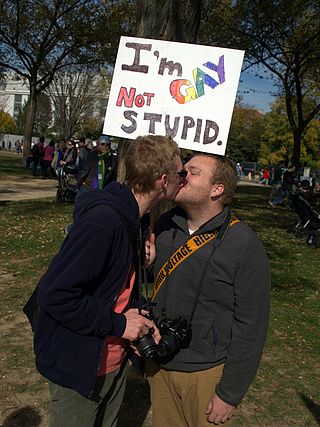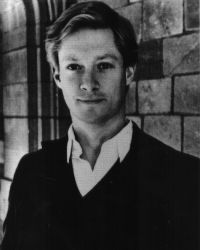Within Christianity, there are a variety of views on sexual orientation and homosexuality. The view that various Bible passages speak of homosexuality as immoral or sinful emerged in the first millennium AD, and has since become entrenched in many Christian denominations through church doctrine and the wording of various translations of the Bible.
Gay bashing is an attack, abuse, or assault committed against a person who is perceived by the aggressor to be gay, lesbian, bisexual, transgender or queer (LGBTQ+). It includes both violence against LGBT people and LGBT bullying. The term covers violence against and bullying of people who are LGBT, as well as non-LGBT people whom the attacker perceives to be LGBT.
Societal attitudes towards same-sex relationships have varied over time and place. Attitudes to male homosexuality have varied from requiring males to engage in same-sex relationships to casual integration, through acceptance, to seeing the practice as a minor sin, repressing it through law enforcement and judicial mechanisms, and to proscribing it under penalty of death. In addition, it has varied as to whether any negative attitudes towards men who have sex with men have extended to all participants, as has been common in Abrahamic religions, or only to passive (penetrated) participants, as was common in Ancient Greece and Ancient Rome. Female homosexuality has historically been given less acknowledgment, explicit acceptance, and opposition. The widespread concept of homosexuality as a sexual orientation and sexual identity is a relatively recent development, with the word itself being coined in the 19th century.
Christian leaders have written about male homosexual activities since the first decades of Christianity; female homosexual behavior was almost entirely ignored. Throughout the majority of Christian history, most Christian theologians and denominations have considered homosexual behavior as immoral or sinful.

Terms used to describe homosexuality have gone through many changes since the emergence of the first terms in the mid-19th century. In English, some terms in widespread use have been sodomite, Achillean, Sapphic, Uranian, homophile, lesbian, gay, effeminate, queer, homoaffective, and same-gender attracted. Some of these words are specific to women, some to men, and some can be used of either. Gay people may also be identified under the umbrella term LGBT.
There are a number of passages in the Hebrew Bible and the New Testament that have been interpreted as involving same-sex sexual activity and relationships. The passages about homosexual individuals and sexual relations in the Hebrew Bible are found primarily in the Torah. The book of Leviticus chapter 20 is more comprehensive on matters of detestable sexual acts. Some texts included in the New Testament also reference homosexual individuals and sexual relations, such as the Gospel of Matthew, the Gospel of Luke, and Pauline epistles originally directed to the early Christian churches in Asia Minor. Both references in the Hebrew Bible and the New Testament have been interpreted as referring primarily to male homosexual individuals and sexual practices.
Abū Bakr Muḥammad ibn ʿAmmār ibn al-Ḥusayn ibn ʿAmmār al-Quḍā'ī, known as Ibn Ammar, in Spanish sources found as Abenámar, was an Arab poet from Silves.

John Eastburn Boswell was an American historian and a full professor at Yale University. Many of Boswell's studies focused on the issue of religion and homosexuality, specifically Christianity and homosexuality. All of his work focused on the history of those at the margins of society.

Exoletus is a Latin term, the perfect passive participle of the verb exolescere, which means "to wear out with age." In ancient Rome the word referred to a certain class of homosexual males or male prostitutes, although its precise meaning is unclear to historians.
Warren Johansson was a philologist, author and a leading American gay scholar during his lifetime. He was founding member of the Scholarship Committee of the Gay Academic Union.
This article largely discusses presence of openly lesbian, gay, bisexual, and transgender and queer bishops in churches governed under episcopal polities. The existence of LGBT bishops in the Anglican, Lutheran, Methodist and other traditions is a matter of historical record, though never, until recently, were LGBT clergy and bishops ordained by any of the main Christian denominations. Homosexual activity was engaged in secretly. When it was made public, official response ranged from suspension of sacramental duties to laicisation.
The Council of London, also known as the Synod of Westminster, was a Catholic church council convened by Anselm, Archbishop of Canterbury, on Michaelmas in 1102. It marked the first major council of his episcopate, as he had been prohibited from convening any during the reign of William II of England. Anselm took the opportunity to initiate the Gregorian Reformation, prohibiting marriage, concubinage, and drunkenness to all those in holy orders, condemning sodomy and simony, and regulating clerical dress, particularly against the recent trend towards pigaches. Anselm also obtained a resolution against the slave trade in England, although this was aimed mainly at the sale of English slaves to the Irish and did not prevent the church from owning slaves.
Li livres de jostice et de plet(z) is an Old French legal treatise compiled by the postglossators of the school of Orléans in the mid-thirteenth century. It was influenced by canon law, Roman law, the customary law of the Orléanais, and the legislation of the Capetian Kings of France. It does not have the sense of a finished work, possesses lacunae, and is somewhat disorganised, being possibly the work of a student of the University of Orléans.

Since 1980, scholars have debated the translation and modern relevance of New Testament texts on homosexuality. Three distinct passages have been taken to condemn same-sex intercourse, but each passage remains contested. Whether these passages refer to homosexuality hinges on whether the social context limits the references to a more specific form: they may prohibit male pederasty or prostitution rather than homosexuality per se, while other scholars hold the position that these passages forbid sex between men in general. Another debate concerns the translation of key terms: arsenokoitēs (ἀρσενοκοίτης), malakos (μαλακός), and porneia (πορνεία). Meanwhile, other passages in the New Testament, such as the Ethiopian Eunuch, the Centurion's Servant, and Jesus's teaching on divorce, may or may not refer to homosexuality.
In medieval Europe, attitudes toward homosexuality varied from region to region, determined by religious culture; the Catholic Church, which dominated the religious landscape, considered, and still considers, sodomy as a mortal sin and a "crime against nature". By the 11th century, "sodomy" was increasingly viewed as a serious moral crime and punishable by mutilation or death. Medieval records reflect this growing concern. The emergence of heretical groups, such as the Cathars and Waldensians, witnesses a rise in allegations of unnatural sexual conduct against such heretics as part of the war against heresy in Christendom. Accusations of sodomy and "unnatural acts" were levelled against the Order of the Knights Templar in 1307 as part of Philip IV of France's attempt to suppress the order. These allegations have been dismissed by some scholars.

Same-Sex Unions in Pre-Modern Europe is a historical study written by the American historian John Boswell and first published by Villard Books in 1994. Then a professor at Yale University, Boswell was a specialist on homosexuality in Christian Europe, having previously authored three books on the subject. It proved to be his final publication, released in the same year as his death.

The Homosexual Matrix is a book by American psychologist Clarence Arthur Tripp, in which the author discusses the biological and sociological implications of homosexuality, and also attempts to explain heterosexuality and bisexuality. The book was first published in 1975 by McGraw-Hill Book Company; it was republished in a revised edition in 1987. Based on his review of the evidence, Tripp argues that people do not become homosexual due to factors such as hormone levels, fear of the opposite sex, or the influence of dominant and close-binding mothers, and that the amount of attention fathers give to their sons has no effect on the development of homosexuality. He criticizes Sigmund Freud and argues that psychoanalytic theories of the development of homosexuality are untenable and based on false assumptions. He maintains that sexual orientation is not innate and depends on learning, that early puberty and early masturbation are important factors in the development of male homosexuality, and that a majority of adults are heterosexual because their socialization has made them want to be heterosexual. He criticizes psychotherapeutic attempts to convert homosexuals to heterosexuality and argues in favor of social tolerance of homosexuality and non-conformist behavior in general.

Homosexuality and the Western Christian Tradition is a 1955 book about the history of Christianity and homosexuality by the theologian Derrick Sherwin Bailey.

Jean II was a French religious figure appointed Bishop of Orleans in 1096, succeeding Jean I in the role, and consecrated in on 1 March 1098. Jean had previously been archdeacon at Tours. He was a nephew of Suger.








